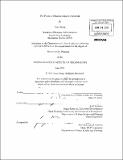| dc.contributor.advisor | Karl Seidman. | en_US |
| dc.contributor.author | Emig, Anne (Anne Nicole) | en_US |
| dc.contributor.other | Massachusetts Institute of Technology. Dept. of Urban Studies and Planning. | en_US |
| dc.coverage.spatial | n-us-ma | en_US |
| dc.date.accessioned | 2011-11-18T21:04:05Z | |
| dc.date.available | 2011-11-18T21:04:05Z | |
| dc.date.copyright | 2011 | en_US |
| dc.date.issued | 2011 | en_US |
| dc.identifier.uri | http://hdl.handle.net/1721.1/67224 | |
| dc.description | Thesis (M.C.P.)--Massachusetts Institute of Technology, Dept. of Urban Studies and Planning, 2011. | en_US |
| dc.description | Cataloged from PDF version of thesis. | en_US |
| dc.description | Includes bibliographical references (p. 66-67). | en_US |
| dc.description.abstract | As traditional industrial uses in the U.S. have declined, Somerville, Massachusetts has similarly seen a decline in active industrial uses, together with a loss of living wage jobs. Somerville, like many New England cities, is now struggling to establish its identity in this "post-industrial" world. The City's large manufacturers have, for the most part, left the City leaving behind an abundance of old and irregular industrial building stock. Mayor Curtatone is on record as being interested in biotechnology, green, and clean energy businesses and City staff are actively seeking opportunities in these areas. At the same time, the City is increasingly becoming a regional destination for small-scale artisanal and food manufacturing. Products being manufactured locally include bicycles, guitars and chocolate. However, this sector faces many challenges such as limited growth and intense competition. Yet despite these challenges, this sector provides economic development returns by bringing new revenue into Somerville and providing lower skill residents with a higher wage than their alternatives in the retail and restaurant industry. What's more, this sector is appropriate for Somerville's land availability and building stock, and it significantly contributes to Somerville's creative brand and therefore its ability to attract more Creative Class residents and businesses. To bolster this sector, Somerville should embark on sector-specific strategy to strengthen the existing consumer goods sector. The cornerstone of this effort will be the creation of an umbrella organization that will provide technical assistance, marketing, and financial assistance to local manufacturers. To support this work, Somerville will also make infrastructure investments and targeted land use policies. With these policies in place, Somerville will create jobs in Somerville for Somerville residents, extract more value from the existing land, and strengthen its "brand" as a "City of Makers." What can other cities learn about manufacturing as an economic development activity from Somerville? When considering a manufacturing strategy, a city must consider: 1) its role within the region; 2) land availability; 3) existing building stock, and; 4) existing and nascent industry networks. Sound economic development strategies should not only attempt to foster profitable uses (tax revenues), but also uses that leverage a city's relative strengths and are aligned with their larger community and economic development goals including a range of jobs, quality of life, and perhaps most importantly, creating a strong identity and pride of place. | en_US |
| dc.description.statementofresponsibility | by Anne Emig. | en_US |
| dc.format.extent | 68 p. | en_US |
| dc.language.iso | eng | en_US |
| dc.publisher | Massachusetts Institute of Technology | en_US |
| dc.rights | M.I.T. theses are protected by
copyright. They may be viewed from this source for any purpose, but
reproduction or distribution in any format is prohibited without written
permission. See provided URL for inquiries about permission. | en_US |
| dc.rights.uri | http://dspace.mit.edu/handle/1721.1/7582 | en_US |
| dc.subject | Urban Studies and Planning. | en_US |
| dc.title | The future of manufacturing in Somerville | en_US |
| dc.type | Thesis | en_US |
| dc.description.degree | M.C.P. | en_US |
| dc.contributor.department | Massachusetts Institute of Technology. Department of Urban Studies and Planning | |
| dc.identifier.oclc | 759083562 | en_US |
